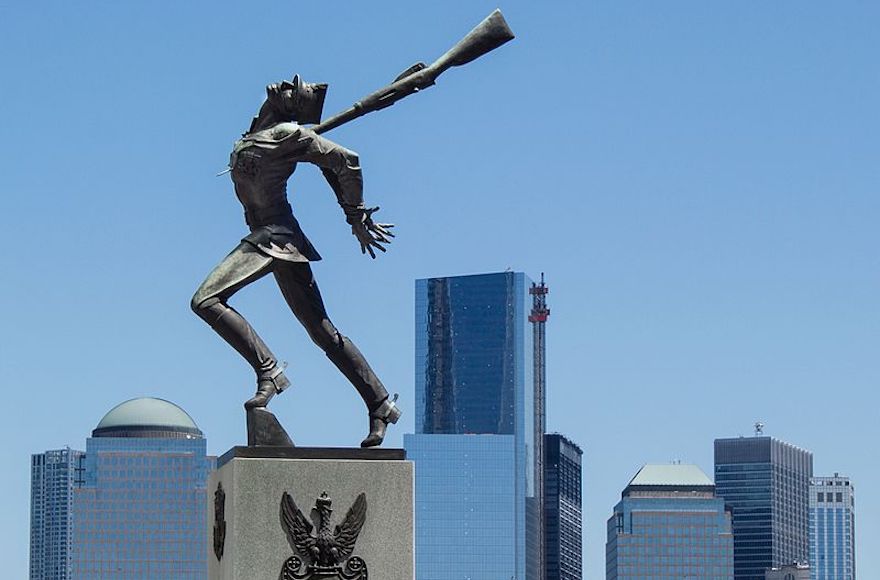WARSAW, Poland (JTA) — Plans to move a monument in Jersey City commemorating the victims of a World War II massacre has sparked protests among people of Polish descent living in the United States, as well as Polish politicians and representatives of the Polish-Jewish community.
Jersey City’s mayor went so far as to call a Polish senator an anti-Semite.
The monument on the east bank of the Hudson River commemorating the Katyn Forest massacre is set to be removed due to work on a waterfront redevelopment project. Polish-American sculptor Andrzej Pitynski created the work in 1991.
In 1940, the Soviet secret police murdered over 20,000 captured Polish citizens, including soldiers and police officers, in the western Russia forest. Several hundred of the victims were Jewish; they were killed by a gunshot to the back of the head.
Mass graves were discovered by the Germans in 1943, and the Soviet Union initially blamed the Nazis. It was not until 1990 that the Russian authorities recognized that it was “one of the grave crimes of Stalinism.”
The bronze and granite statue shows a tied-up Polish soldier who has been stabbed in the back with a rifle bayonet.
Jersey City Mayor Steven Fulop has asserted that the city is not removing the monument completely but rather putting it in storage until the park planned for the area on which it sits is completed. But some city officials say the monument may be moved to a new site, so that children visiting the park are not confronted with the brutal murder scene.
A Polish state senator, Stanislaw Karczewski, in an interview with Polish Radio called the decision to relocate the monument “scandalous,” saying it “speaks of Polish heroism, Polish heroes, and also speaks of tragic events.” Karczewski is a member of the Law and Justice Party, which sponsored the legislation passed in January that criminalizes blaming the Polish nation for Nazi crimes.
Fulop, tweeting in response, called Karczewski a “known anti-Semite, white nationalist and Holocaust denier.” He added: “I always wanted to tell him that.”
Fulop, who is Jewish, did not cite evidence for calling Karczewski an anti-Semite, and did not immediately respond to JTA’s request for comment.
The Never Again association, which monitors racism in Poland, said they knew of no evidence to support Fulop’s accusations, which they called “a little provocative.” From the Depths, a Jewish organization dealing with Holocaust commemoration, called the charges “utterly groundless.”
In a letter sent Friday to Fulop, Poland’s ambassador to the U.S., Piotr Wilczek, called on the mayor to apologize.
“Your statements were false, hurtful, and unbefitting of international dialogue between office holders of two Allied countries,” Wilczek wrote. “Let us clear the air and refocus our attention to the task at hand: constructive dialogue to find a solution that does not involve the permanent location of the Katyn Memorial.”
Fulop said he does not intend to apologize and emphasized in another tweet that he won’t meet with people “that try to rewrite history on their country’s role in a Holocaust.”
Jewish leaders in Poland said in a statement that they “don’t understand, and disagree with, the plans to remove the monument dedicated to Katyn victims.” The Jewish leaders — Chief Rabbi Michael Schudrich; the president of the Warsaw Jewish community; Anna Chipczynska, president of the Jewish Community of Warsaw; and Leslaw Piszewski, the president of the Union of Jewish Communities — said as members of the Polish community, they “consider it a moral obligation to commemorate all the victims of this crime in Poland and around the world, including Jersey City.”
JTA has documented Jewish history in real-time for over a century. Keep our journalism strong by joining us in supporting independent, award-winning reporting.






